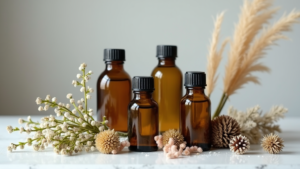Welcome to the world of natural remedies for respiratory problems! In this article, you will discover the wonders of essential oils and how they can help alleviate common respiratory issues such as congestion, cough, and allergies. With their soothing and healing properties, essential oils are a safe and effective alternative to traditional medications. Get ready to breathe easier and feel better with the power of nature’s remedies at your fingertips. Have you ever struggled with respiratory problems such as allergies, asthma, or bronchitis? Are you looking for natural remedies to help ease your symptoms and improve your overall respiratory health? If so, you’re in the right place! In this article, we will explore the world of essential oils and how they can be used to support your respiratory system. Whether you’re dealing with congestion, coughing, or difficulty breathing, essential oils may provide the relief you’re seeking. Let’s dive in and discover the powerful benefits of essential oils for respiratory problems together!

Contents
Understanding Respiratory Problems
Respiratory problems can range from mild symptoms like a runny nose or cough to more severe conditions such as asthma or chronic obstructive pulmonary disease (COPD). These issues can be triggered by a variety of factors, including allergens, pollutants, infections, and smoking. It’s essential to understand the root cause of your respiratory problems to effectively manage and treat them.
Take a Deep Breath
When you’re struggling to breathe comfortably, it can be challenging to focus on daily tasks and enjoy life to the fullest. Respiratory problems can impact your quality of life and overall well-being. By incorporating essential oils into your routine, you can potentially alleviate symptoms, reduce inflammation, and promote easier breathing. These natural remedies offer a holistic approach to respiratory health, addressing both physical and emotional aspects of your well-being.https://www.youtube.com/embed/09RHUN1az2w
Benefits of Essential Oils for Respiratory Health
Essential oils are concentrated plant extracts that have been used for centuries for their medicinal properties. When inhaled or applied topically, these oils can have a soothing and healing effect on the respiratory system. Here are some of the key benefits of using essential oils for respiratory problems:
Natural Remedies
Unlike synthetic medications that may have unwanted side effects, essential oils are natural remedies that come directly from plants. This makes them a safe and gentle option for individuals seeking alternatives to conventional treatments. By harnessing the power of nature, you can support your body’s innate ability to heal itself and restore balance.
Anti-inflammatory Properties
Many essential oils possess anti-inflammatory properties that can help reduce swelling and irritation in the respiratory tract. Inflammation is a common underlying factor in respiratory problems, and by targeting this issue, essential oils can help ease symptoms such as coughing, wheezing, and shortness of breath.
Antimicrobial Effects
Certain essential oils have antimicrobial properties that can help fight off infections and cleanse the airways. When inhaled, these oils can kill harmful bacteria, viruses, and fungi that may be contributing to your respiratory issues. By creating a cleaner environment in your lungs, essential oils can support your body’s immune response and reduce the risk of recurrent infections.

Top Essential Oils for Respiratory Problems
There are numerous essential oils that can benefit your respiratory health, each with its own unique properties and uses. It’s essential to choose high-quality, pure essential oils from reputable sources to ensure their effectiveness and safety. Here are some of the top essential oils for respiratory problems:
Eucalyptus Oil
Eucalyptus oil is a popular choice for respiratory issues due to its decongestant, antiviral, and expectorant properties. This oil can help clear nasal congestion, reduce coughing, and support healthy lung function. Eucalyptus oil is commonly used in chest rubs, steam inhalation, and diffusers to promote easy breathing.
Peppermint Oil
Peppermint oil is known for its cooling sensation and invigorating aroma, making it a great choice for respiratory relief. This oil can help open up the airways, alleviate sinus pressure, and soothe sore throats. Peppermint oil is often used in inhalers, throat sprays, and massage oils to combat respiratory symptoms.
Tea Tree Oil
Tea tree oil has powerful antimicrobial properties that make it effective against respiratory infections and inflammation. This oil can help kill bacteria and viruses in the airways, reducing the risk of respiratory illnesses. Tea tree oil can be diffused, applied topically, or used in steam inhalation to support respiratory health.
Lavender Oil
Lavender oil is well-known for its calming and soothing effects on both the mind and body. This oil can help relieve stress, anxiety, and tension that may exacerbate respiratory problems. Lavender oil can be inhaled, applied to the skin, or used in a bath to promote relaxation and ease breathing difficulties.
Lemon Oil
Lemon oil is a refreshing and uplifting essential oil that can help clear the airways and enhance respiratory function. This oil has antibacterial and expectorant properties, making it ideal for combating colds, coughs, and congestion. Lemon oil can be diffused, added to a warm compress, or used in cleaning products to purify the air and reduce respiratory symptoms.

How to Use Essential Oils for Respiratory Relief
There are several ways to incorporate essential oils into your daily routine to support your respiratory health. From inhalation to topical application, these oils can be used in various forms to provide relief from respiratory symptoms. Here are some effective methods for using essential oils for respiratory relief:
Aromatherapy
Aromatherapy involves inhaling essential oils through diffusion, steam inhalation, or direct inhalation to benefit from their therapeutic effects. You can use a diffuser to disperse essential oils into the air, creating a calming and healing atmosphere in your home or office. Steam inhalation involves adding a few drops of essential oil to a bowl of hot water and inhaling the steam to clear your airways and reduce congestion.
Topical Application
Essential oils can be diluted in a carrier oil and applied topically to the skin for targeted respiratory relief. You can massage essential oil blends onto your chest, back, throat, or feet to promote easier breathing and reduce inflammation. Be sure to perform a patch test before applying essential oils to your skin to check for any sensitivities or reactions.
Inhalers and Sprays
Portable inhalers and sprays can be filled with essential oil blends for on-the-go respiratory support. You can inhale the aroma of the oils directly from the inhaler or spray them onto your throat and chest for quick relief from coughing, congestion, and other respiratory symptoms. These convenient tools allow you to access the benefits of essential oils anytime, anywhere.
Baths and Compresses
Adding essential oils to a warm bath or compress can help relax your body and soothe respiratory discomfort. You can mix a few drops of essential oil with Epsom salts or carrier oil and add them to your bathwater for a calming and therapeutic experience. You can also apply a warm compress infused with essential oils to your chest or sinuses to alleviate congestion and promote easier breathing.

Safety Precautions When Using Essential Oils
While essential oils can offer many benefits for respiratory health, it’s essential to use them safely and responsibly to avoid adverse reactions. Here are some safety precautions to keep in mind when using essential oils for respiratory relief:
Dilution
Essential oils are highly concentrated and should be diluted in a carrier oil before applying them to the skin. Dilution helps reduce the risk of skin irritation, sensitization, or allergic reactions. The standard dilution ratio is 1-2% essential oil to carrier oil for adult use, but it may vary depending on the individual’s sensitivity and the specific oil being used.
Patch Test
Perform a patch test before using a new essential oil to check for any skin sensitivities or allergic reactions. Apply a small amount of diluted oil to a small area of skin and wait 24 hours to see if any redness, itching, or irritation occurs. If you experience any adverse reactions, discontinue use of the oil immediately.
Sensitization
Some essential oils may cause sensitization over time, leading to allergic reactions upon repeated exposure. It’s essential to rotate your essential oils and avoid using the same oils consistently for long periods. This helps prevent sensitization and allows your body to reset its response to the oils.
Pregnancy and Children
Pregnant women, infants, and young children have unique sensitivities to essential oils and should use them with caution. Certain oils are contraindicated during pregnancy or for young children, so it’s essential to consult with a healthcare provider or qualified aromatherapist before using essential oils in these populations.
Quality
Choose high-quality, pure essential oils from reputable sources to ensure their safety and efficacy. Look for oils that are organic, therapeutic grade, and free of synthetic additives or contaminants. Always read the labels and use oils as directed to maximize their benefits and minimize the risk of adverse effects.

Conclusion
In conclusion, essential oils are valuable tools for supporting respiratory health and alleviating symptoms associated with respiratory problems. By harnessing the power of nature, you can enhance your well-being, reduce inflammation, and promote easier breathing. Whether you’re looking to clear congestion, soothe a cough, or enhance your lung function, essential oils offer a natural and holistic approach to respiratory relief. Remember to choose high-quality oils, use them safely, and consult with a healthcare provider if you have underlying health conditions or concerns. With the right essential oils and proper guidance, you can breathe easier and enjoy a healthier respiratory system. Take a deep breath, relax, and let the healing scents of essential oils surround you. Your respiratory health is in good hands!





